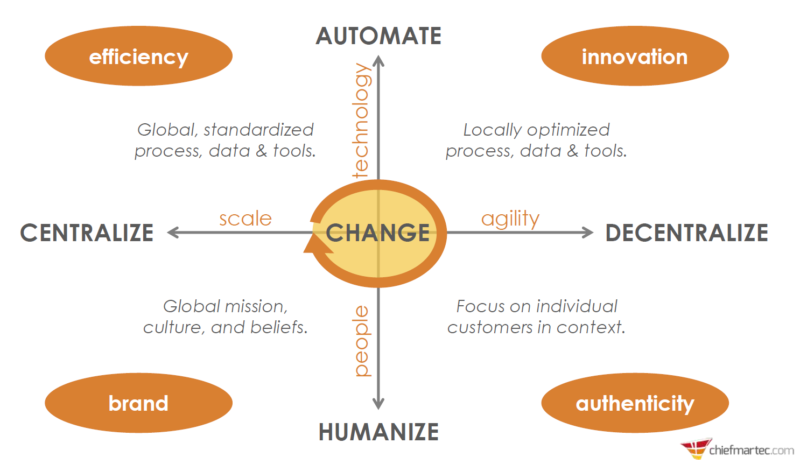Decentralize now! Marketers are embracing change at a time when it is needed most
Scott Brinker kicked off Discover MarTech highlighting the need to for MOPs teams to implement decentralization practices to adapt to challenges brought on by the pandemic.
“It’s been really fascinating to see how companies that had the ability to decentralize could adapt to this new environment.”
That was the big takeaway from MarTech conference chair Scott Brinker as he kicked off our Discover MarTech virtual conference on Tuesday.
Before the coronavirus pandemic crisis, much of a marketing operations team leader’s time was spent balancing centralizing efforts for scale while maintaining decentralized processes for agility, he said.
But now, as teams have had to make dramatic shifts in record time, decentralization is quickly gaining more traction since agility and operational flexibility is more needed than ever.

The data backs it up, too. Nearly 50 percent of marketing teams report their current marketing activity can best be described as “shifting tactics,” according to a recent study from Element-R Partners, with 74% claiming their company has stopped or altered its marketing in response to the coronavirus.
Decentralization is the ability to react quickly to changing business models and decentralized systems are more readily able to deliver self-service capabilities and offer more bandwidth in terms of distribution.
Centralized processes just take longer to change, Brinker said. Decentralization offers adaptability and flexibility — two components that are especially necessary right now as most marketing teams are unsure about what’s next.
“Pretty much everyone has had to make changes of one kind or another,” he said.
Planning for the future
In his keynote, Scott referenced a recent eMarketer report that found 67% of U.S. agency and brand-buy decision-makers had not made decisions on ad buys for the second half of 2020. In other words, more than two-thirds of marketing teams still have no idea what’s to come in terms of their advertising efforts.
The one thing we do know: companies committed to digital transformation are ahead of the curve in terms of surviving the current economic conditions. Businesses that have made digital transformation a priority are implementing tools that make information more accessible across the organization, according to report from TEKSystems that looked at “digital transformation leaders” versus “digital transformation laggards.” Nearly half of the leaders are turning to digital self-service technology for both employees and business partners’ use.
As Brinker is quick to note, the businesses that put digital transformation initiatives at the top of their to-do list — designing processes that enable change, implementing open platforms and self-service tools and incorporating agile practices into their daily routines — are most likely to overcome the challenges at hand.
The quote Scott included in his presentation from Gartner Senior Director Analyst Sandy Shen says it best: “This is a wake-up call for organizations that have placed too much focus on daily operational needs at the expense of investing in digital business and long-term resilience. Business that can shift technology capacity and investments to digital platforms will mitigate the impact of the outbreak and keep their companies running smoothly now, and over the long-term.”
Contributing authors are invited to create content for MarTech and are chosen for their expertise and contribution to the martech community. Our contributors work under the oversight of the editorial staff and contributions are checked for quality and relevance to our readers. MarTech is owned by Semrush. Contributor was not asked to make any direct or indirect mentions of Semrush. The opinions they express are their own.
Related stories